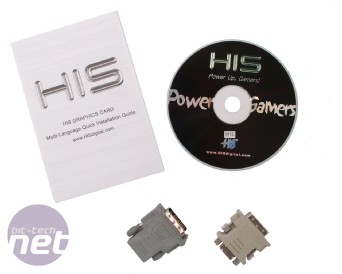
HIS ATI Radeon HD 4670 IceQ 512MB
Manufacturer: HISUK Price (as reviewed): £68.99 (inc. VAT)
US Price (as reviewed): $64.99 (ex. Tax)
Core Clock: 750MHz
Memory Clock: 2,000MHz (effective)
Memory: 512MB GDDR3
Warranty: Three years (parts and labour)
With all our recent coverage of ultra high end graphics launches like the Nvidia Geforce GTX 295, GeForce GTX 285 and ATI Radeon HD 4850 X2, bit-tech has hardly been the most credit-crunch friendly website around. While we’ve been focusing on the ultra high end hardware that we all dream of owning, the reality is that many of us can’t spare a few quid to buy luxury loo roll because of the way the economy is, let alone a few hundred quid to splash out on a new graphics card.
This is where “mid range” cards like the HIS Radeon 4670 IceQ that we’re looking at today come into play, claiming to offer decent performance at a price tag well south of £100. We first looked at ATI’s Radeon HD 4670 architecture back in September 2008, but without the knowledge of e-tailer pricing. Now the cards have been on sale for a solid five months, it’s time to find out if HIS’ offering is a mid-range, credit crunch buster, or in need of government backed bail-out.
Like many of the partner cards we look at here at bit-tech, HIS has chosen to replace ATI’s basic stock cooling solution with its own custom GPU cooler, switching out the diminutive copper stock cooler for a dual slot, paddle fan based cooler. In fact, the cooler used here, originally designed by Arctic Cooling, is something of a golden oldie, having been used by HIS on its cards in one iteration or another for over four years – a quick look back at Tim’s review of the HIS X700 Pro IceQ from March 2005 reveals an almost identical cooler.
As the saying goes though, “If it ‘aint broke, don’t fix it,” - HIS has used the familiar paddle fan and funnelled shroud in conjunction with a chunky aluminium heatsink to drive hot air created by the GPU directly out the rear of your case, something that the teeny stock 4670 cooler isn’t able to do.
However, there’s no extra cooling for the 4670 IceQ’s 512MB of GDDR3, with the chips left open to the air due the low thermal output of the 59W RV730XT GPU. HIS has chosen to ship the card with an unchanged core clock of 750MHz, while the memory clock has been increased to 1,000MHz (2,000MHz effective). Whether this will any improvement in performance over the standard 900MHz (1,800MHz) memory frequency we originally tested remains to be seen.
Other than the slightly raised memory speed though (which barely counts, as it was supported by stock cards at release), there’s been no attempt to factory overclock the HIS Radeon HD 4670 IceQ – a disappointment considering the improved cooling afforded by custom heatsink fan solution.
Bundle-wise, the HIS Radeon 4670 IceQ is pretty barebones, with just a quick start guide, driver CD, DVI to VGA and DVI to HDMI adapters, although frankly we’d rather board partners packaged less with their cards and kept the price down than bundle them with tons of (usually un-used) hardware and software.
Warranty:
HIS offers a three year limited warranty on all of its products that covers parts and labour. During the first year, this warranty is held with the retailer where you purchased the card and the remaining two years are handled by the manufacturer.One thing that is definitely noteworthy is the fact that the warranty doesn’t start when you purchase the card, instead it starts from the day when the card was manufactured – that’s not ideal if the card is going to sit in a warehouse for six months. Despite that though, a good thing with HIS’s warranty terms is that you’re able to transfer this warranty should you choose to sell the card at a later date – this should sweeten the deal a little bit even if you’re put off by when the warranty term starts.

MSI MPG Velox 100R Chassis Review
October 14 2021 | 15:04












Want to comment? Please log in.